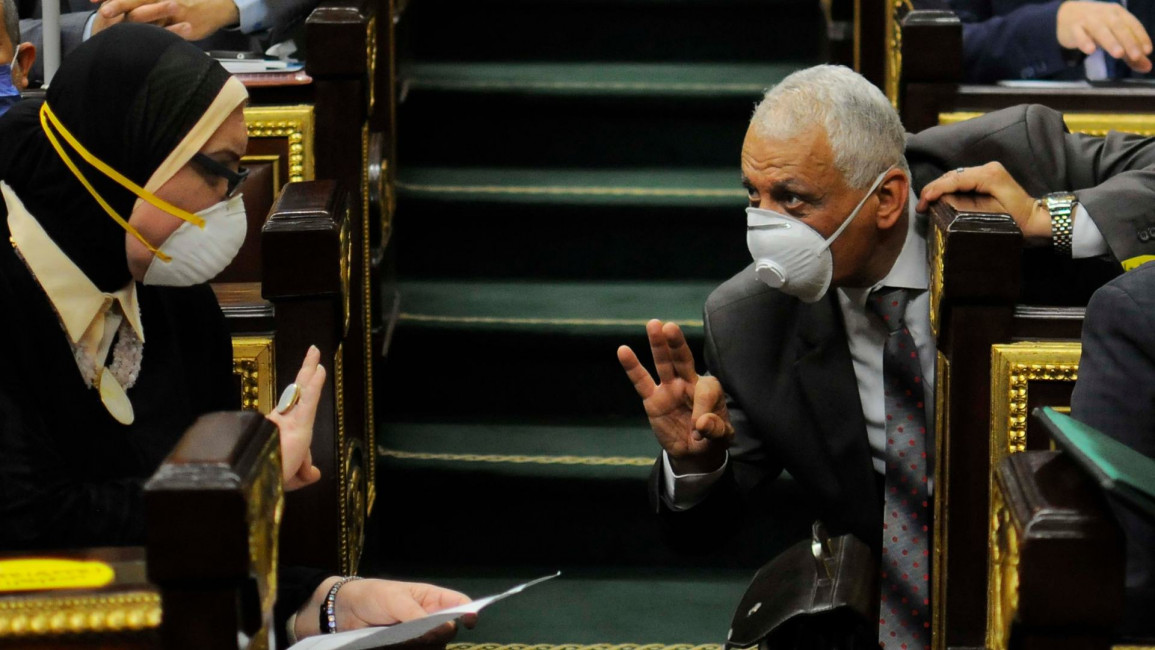Egypt adopts a coronavirus 'coexistence plan' as Middle East countries look to end lockdowns
Egypt adopts a coronavirus 'coexistence plan' as Middle East countries look to end lockdowns
Egypt has adopted measures that it believes will allow it to 'coexist' with coronavirus.
3 min read
Egypt's parliamentarians take precautionary measures as sessions resume [NurPhoto/Getty]
Egypt is charting a way out of its coronvirus lockdown, adopting a plan to "coexist" with the pandemic despite a spike in Covid-19 cases and deaths in recent days.
Egypt is planning to gradually re-open shops and restaurants with a review of the situation every two weeks, The New Arab's Arabic-language service reported on Wednesday.
Egypt's Health Minister Hala Zayed outlined the country's "coexistence" plan during a remote cabinet meeting, stipulating that places which carry a high risk of transmission will remain closed.
Electronic card payments, online purchasing, and home deliveries will also be recommended under the plan.
Zayed also outlined Egypt's current capacity to deal with the coronavirus outbreak, saying the country currently has 17 hospitals, 3,214 beds, 527 intensive care beds and 413 ventilators.
Egypt is also preparing 13 centres to receive less serious cases.
Electronic card payments, online purchasing, and home deliveries will also be recommended under the plan.
Egypt is also preparing 13 centres to receive less serious cases.
Egypt's has recorded 5,268 Covid-19 cases in the population of 100 million as of Thursday, according to the John Hopkins tracker, of which 380 have died.
Egyptian President Abdel Fattah al-Sisi on Tuesday ordered the renewal for another three months of the long-running state of emergency, citing health as well as security concerns.
 |
| [Click to enlarge] |
It gives police broad powers of arrest and detention and curtails constitutional rights such as freedom of speech and assembly.
Read more: Sisi uses coronavirus to enshrine new powers at the expense of his people
Meanwhile, Tunisia has also detailed how it will be easing the country's coronavirus lockdown.The Tunisian government has decided it will gradually lift public restrictions starting from May 4, according to The New Arab's Arabic-language service.
The government also announced that the move will have certain conditions and that its results will be evaluated, after which a decision will be taken to continue the measures or reimpose a lockdown.
The government said children under 15 years old, the elderly over 65, pregnant women and those with chronic diseases will not see any changes in their restrictions.
The government also announced that the move will have certain conditions and that its results will be evaluated, after which a decision will be taken to continue the measures or reimpose a lockdown.
The government said children under 15 years old, the elderly over 65, pregnant women and those with chronic diseases will not see any changes in their restrictions.
Businesses will be allowed to open during an initial phase, between May 4 and 24. Among the conditions for this are the introduction of a rotation system, with one working day and one rest day, and regulating the attendance of employees.
Social distancing will have to be maintained on public transport and anyone who does not have a work permit will be prevented from travelling on it.
Read more: Tunisia opens new women's shelter as domestic abuse surges during lockdown
Tunisia's Health Minister Abd al-Latif al-Makki stressed the importance of social distancing, avoiding gatherings, and the wearing of masks - which will be distributed at distribution points and pharmacies.
Secondary school students set to take final exams will be allowed to return to school at the end of May, the educaiton minsiter said. University students will go back to their studies in June.
Tunisia has confirmed 980 cases of Covid-19 and 40 deaths. The country has been under a 6pm to 6am curfew since March 17 and authorities imposed stricter lockdown orders on March 22.
Agencies contributed to this report.
Follow us on Facebook, Twitter and Instagram to stay connected
Read more: Tunisia opens new women's shelter as domestic abuse surges during lockdown
Tunisia's Health Minister Abd al-Latif al-Makki stressed the importance of social distancing, avoiding gatherings, and the wearing of masks - which will be distributed at distribution points and pharmacies.
Secondary school students set to take final exams will be allowed to return to school at the end of May, the educaiton minsiter said. University students will go back to their studies in June.
Tunisia has confirmed 980 cases of Covid-19 and 40 deaths. The country has been under a 6pm to 6am curfew since March 17 and authorities imposed stricter lockdown orders on March 22.
Agencies contributed to this report.
Follow us on Facebook, Twitter and Instagram to stay connected



